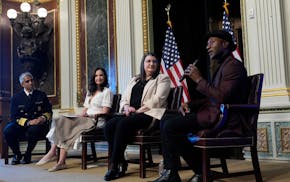Proponents of the statewide smoking ban that went into effect in October argued for it in part because they said it would reduce health risks for the people who are the most exposed to second-hand smoke -- the 176,000 bartenders, waiters and waitresses who work in the state's hospitality industry. Now, a tobacco researcher from the University of Minnesota says she's proved it.
The study: Dr. Dorothy Hatsukami, who heads the university's tobacco research center, recruited 24 nonsmokers from around the state who worked at bars, restaurants and bowling alleys that permitted smoking. Before the ban went into effect, she tested their urine for nicotine and a carcinogen. Then she tested them again after the ban. The study will be submitted for publication in the journal Cancer Epidemiology, Biomarkers & Prevention.
The results: On average, the levels of nicotine and the carcinogen dropped by more than 80 percent, she found in results that will be made public today. "It may seem very obvious," she said. "But the implications are that [the ban] really works. It is protecting our workers from cancer-causing agents."
Why it matters: Research shows that nonsmoking hospitality employees have up to a 50 percent higher risk of lung cancer. Still, like their operators in the hospitality industry, employees were split over the ban before it was passed. This year, bills have been introduced at the Legislature to create exemptions for certain bars and clubs. But these research results show that loosening the ban "would put these employee's health in danger," said Kerri Gordon, public relations manager for ClearWay Minnesota, an advocacy group that provides research money and smoking cessation services in the state. ClearWay funded this research. Gordon said it provides "scientific proof that it's important to protect hospitality workers."
Reaction: "Wow," said Nancy Goldman, president of Local 17, the union that represents restaurant bar workers in Minnesota, when she was told of the results. "That's almost unbelievable." But it does not make her favor the ban or make up for the fact that it has proven to be financially painful for many bars and restaurants. "It's a foregone conclusion" that the ban would reduce her members' health risks, she said. "But the ban had a real impact on our small shops."
Josephine Marcotty • 612-673-7394
Phish fans are famously dedicated. What happens when they enter the Sphere?
Minneapolis will bid to host Sundance Film Festival

Icehouse on Eat Street in Mpls. facing eviction for unpaid rent
